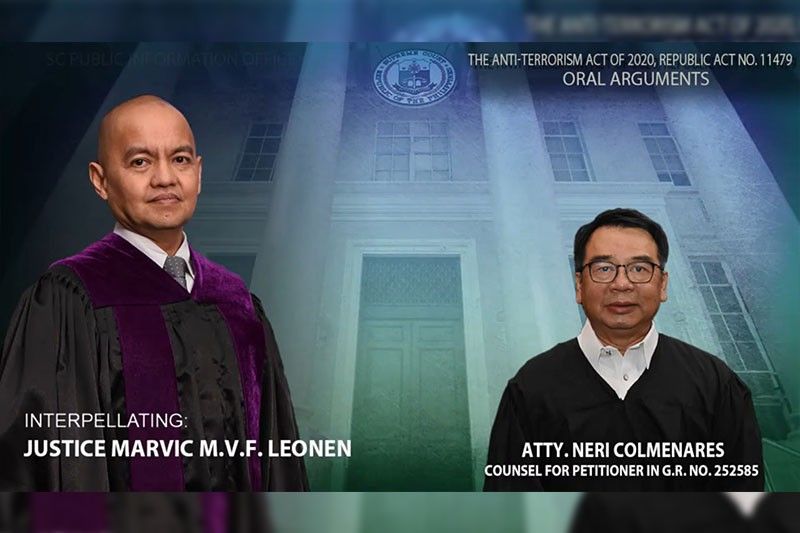Colmenares fears anti-terror law may prompt junking of habeas corpus pleas

MANILA, Philippines — One of the main arguments of petitioners against the Anti-Terrorism Act is that the law transgressed the Constitution when it allowed up to 24 days of detention, without judicial warrant, of suspected terrorists.
They contend that under the Constitution, even during when martial law was declared or when the writ of habeas corpus is suspended in case of invasion and rebellion, a person arrested must still be charged within three days.
On the resumption of the oral arguments on the anti-terrorism law on Tuesday, Associate Justice Marvic Leonen posed this to the petitioners: But can the ATA preclude those detained for more than three days from running to the court, through a petition for a writ of habeas corpus?
Habeas corpus literally translates to “produce the body.” It is an order to present a person before the court to determine if the arrest or imprisonment is legal or if the inmate must be released from custody.
Does the law remove the right of the accused to file the petition for habeas corpus?
Leonen’s interpellation of National Union of Peoples’ Lawyers chair Neri Colmenares started with a joke when the latter went to a spot for the solicitor general.
“That’s usurpation,” Leonen quipped, adding that Colmenares may be quo warranto’d, the petition filed by Solicitor General Jose Calida to boot our Maria Lourdes Sereno as former chief justice.
The rest of their rather tense exchanges, however, went on to discuss Section 29 of RA 11479 or on Detention Without Judicial Warrant of Arrest.
Under this provision, law enforcers or military can take custody of a suspected terrorist, with written authorization of the Anti-Terrorism Council (ATC), up to 14 days and extendible with another ten days before the accused should be brought to judicial authorities and not incur any criminal liability.
“If a person is detained because of a provision now in the ATA, is a [petition for] habeas corpus still applicable?” Leonen asked Colmenares. The justice pointed out that the said section only says the rule on arbitrary detention will not apply.
Colmenares said the accused may still pursue the petition for writ of habeas corpus, but he pointed out that the ATA specifically has a section on allowing “detention without judicial warrant and authorization of the ATC was empowered by the law.”
“Because the law allows the ATC to do that then habeas corpus [petition] could be dismissed immediately with the judge,” the NUPL chair added.
Leonen pointed out: So the accused, even with ATA in effect, retains his right and still file a petition for habeas corpus.
“Well, the filing itself your honor [is not removed] but the effectiveness of the remedy is already removed,” Colmenares said.
Leonen, however, noted that the petition for writ of habeas corpus will be filed to a court of law, even to the Supreme Court.
“And you’re telling us that when they file for a petition for habeas corpus we will certainly dismiss it. You know better than the Manila Times, the result of the action of the court? You know better than us?” the justice said, with an apparent dig to the exclusive reports carried by the broad sheet on SC actions and draft rulings.
Colmenares pleaded: “Your honor please, the title of the law your honor is detention without judicial warrant so the court will say, ‘well that was valid under the law.’”
Leonen rebutted that this was only Colmenares’ interpretation and he is not a judge or a justice of the SC, to which the rights lawyer conceded.
“Part of the way that we can clarify is it’s possible to file a petition for habeas corpus and when the petition is filed, it is up to the court to attend at that moment to see whether the three days or the 14 days [of detention] will apply, correct?” Leonen said.
Is anyone detained under Section 29?
The justice then referred to his questioning during the first day of the oral arguments on whether they should wait for an incident. He asked Colmenares whether he or any of his clients had been detained under the ATA.
Leonen last week referred to the case of the two Aeta farmers charged with violation of the ATA and had manifested to join the petitioners as "maybe the actual case." Their pleading, however, was dismissed on Tuesday morning, just as Solicitor General Jose Calida said they obtained the Aetas' manifestation that they wish to withdraw their petition-in-intervention.
RELATED: Calida says 2 Aeta farmers wish to withdraw petition to join fight vs anti-terrorism law | No coercion in Aeta farmers' SC plea, NUPL says after government swoops in
Replying to Leonen's question, Colmenares said that in the more than 30 progressive groups which he represents in their petition, there is no one so far. The NUPL chair, however, noted the petition also covers civil and political rights placed within the ambit of terrorism.
Leonen said this is a question he would pose to veteran rights lawyer Chel Diokno of the Free Legal Assistance Group.
Diokno, with former Solicitor General Jose Anselmo Cadiz and Constitutional Law professor Alfredo Molo III were designated by the petitioners to present and argue on whether they have legal standing to sue and the supposed overbreadth of Section 4.
Colmenares was assigned to discuss whether Sections 5 to 14 of the law, penalizing threats to commit terrorism, planning, training, preparing, and facilitating terrorism, conspiracy, proposal, inciting to terrorism, material support, and other related provisions violate the prohibition against ex post facto laws and bills of attainder.
Interpellation of the petitioners will continue next week, on its third hearing already, on February 16 afternoon.
Recaps on the two days of the oral arguments meanwhile may be read here and here.
- Latest
- Trending
































